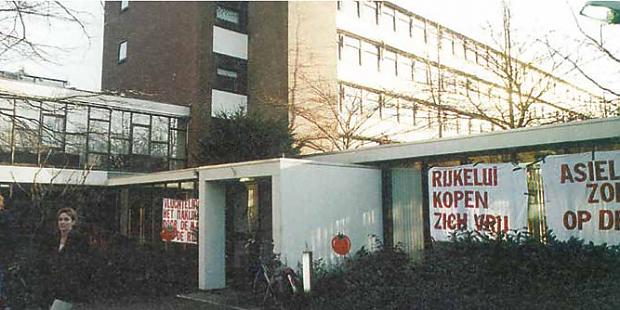Prosperous towns should play their part in accommodating refugees
Prosperous towns should play their part in accommodating refugees

Millions of people are being forced to leave their homes by dire poverty, terrorism, natural disasters, human rights abuses or war. A long, hard path awaits them. Reports appear by the week of refugees who failed to survive their flight. We must tackle the fundamental causes of this situation. That means halting the bombing and the unjustifiable wars, stopping facilitating tax evasion and tax avoidance, and giving priority to combating poverty and inequality instead of to profits.
by Jasper van Dijk
Our country could be doing a great deal more to tackle the roots of the refugee problem. It could, for example, pull out of military actions in Syria, Afghanistan and Iraq, and also acknowledge that the Netherlands is a tax haven.
 Until a more peaceful and more equal world becomes a reality, people will continue to risk their lives for a better future for themselves and their children. Refugees go in the main directly to countries which neighbour their own. Some 90% are currently still in the region of their own country, while a quarter of Lebanon's inhabitants are refugees. The camps are overcrowded and there are shortages of everything. People are often unable to work in order to provide for themselves, or are not permitted to do so. As things stand, there are 1.3 million vulnerable people who would prefer to be rehoused elsewhere, and as soon as possible. This includes people from sexual (LGBTI) minorities who are in danger as a result of their sexuality, as well as old people and those with disabilities which make them unable to survive in the region. There is no sign, unfortunately, of global solidarity. The West would rather send additional funds than really address the causes of the flow of refugees. This is despite repeated calls from the United Nations High Commission on Refugees (UNHCR) to do just that. Eventually young men and women, given the lack of any prospects, see no alternative but to leave. Some of them come to the Netherlands.
Until a more peaceful and more equal world becomes a reality, people will continue to risk their lives for a better future for themselves and their children. Refugees go in the main directly to countries which neighbour their own. Some 90% are currently still in the region of their own country, while a quarter of Lebanon's inhabitants are refugees. The camps are overcrowded and there are shortages of everything. People are often unable to work in order to provide for themselves, or are not permitted to do so. As things stand, there are 1.3 million vulnerable people who would prefer to be rehoused elsewhere, and as soon as possible. This includes people from sexual (LGBTI) minorities who are in danger as a result of their sexuality, as well as old people and those with disabilities which make them unable to survive in the region. There is no sign, unfortunately, of global solidarity. The West would rather send additional funds than really address the causes of the flow of refugees. This is despite repeated calls from the United Nations High Commission on Refugees (UNHCR) to do just that. Eventually young men and women, given the lack of any prospects, see no alternative but to leave. Some of them come to the Netherlands.
Protest in Oranje
During the increased flow of refugees into the Netherlands in 2015, emergency reception centres were speedily established. There were even camps of tents capable of housing thousands. The speed of the response was praiseworthy, but the democratic calibre of the decisions and the conditions with which the refugees were confronted much less so. In this period the hundred richest local authority districts opened just three new reception centres, while the hundred poorest established sixteen. This confirms a trend which we have seen before in the recent past. Between 2005 and 2016, local authorities for areas where many people have low incomes accepted more than three times as many refugees as did high incomes areas. Another development which we are seeing return is the placing of large numbers in small towns and villages. The last government, the second headed by Mark Rutte, was planning to accommodate 1,400 refugees in the tiny village of Oranje, with a population of 140. The decision, which was taken as a result of the lack of democratic consultation, provoked a great deal of protest from the inhabitants. An end must therefore be put to this sort of excess. This requires the efforts of the whole of the Netherlands, and not only the poor but certainly also the rich areas. In order to achieve this, a range of measures must be taken.
Capacity
As things stand people who have been granted a residence permit are spread across a variety of local authority districts. Refugees who are still going through the application procedure should also be distributed according to a local authority's 'draagkracht', a measure of a its capacity to receive asylum seekers, calculated on the basis of population and average income. Every local authority, including the richest, has a legally-defined duty to create places of refuge. Because the distribution is unequal, new reception centres should be placed in wealthier areas.
Participation
Within each local authority region too, refugees are often sent directly to the poorest districts. One local person in the Rotterdam district of Beverwaard complained that “high unemployment, poverty, murders, shoot-outs, we've had the lot. We're just getting ourselves back on our feet a little and now we've got an asylum centre.” Nine of the ten biggest Dutch cities have located their emergency reception centres in poor districts. At the same time, the establishment of a reception centre in the wealthy district of Benoordenhout in The Hague is opposed by the nationally governing party the right-wing VVD, which has described the proposal as 'unspeakable'. In Oudenbosch in North Brabant, rich inhabitants bought a parcel of land in order to prevent the establishment of a reception centre for 750 refugees. In Den Helder, the same kind of people bought property, in this case to stop sixteen child refugees being placed there by the national organisation for aid to asylum seekers, the COA.
In order to put an end to the shifting of reception centres for refugees on to poor districts, the COA, when looking for suitable locations, must take note of a neighbourhood's capacity, bearing in mind its average income and the availability of services such as schools and public transport. Input from people living there and from the refugees themselves is of the utmost importance in this.
Small-scale reception centres
Surveys show that 71% of Dutch people have no problem with reception centres for refugees being located in their neighbourhoods, provided these are small. Ask about large-scale facilities, and support falls away. During the exceptionally rapid influx of 2015, a minimum size of 300 refugees was stipulated. That figure should in fact be the maximum in a system of distribution based on population and income of the host town or village. This is important if people are to be kept onside with a generous and humane refugee policy, and it's much better for the refugees themselves. In small-scale reception centres they will be better able to work through their traumas and begin the process of building a new life. There is less chance of conflict between different groups, people can live more independently and are better equipped to build relationships with the staff.
Fairer division of refugees
Lastly, scenarios such as that which emerged in 2015, when locations had to be decided and implemented within a few days, should be avoided. At that time there was no possibility of democratic input from local people, who were overwhelmed by the arrival of the newcomers. Furthermore, the reception centres were inadequately equipped to deal with the asylum procedure, or offer education, meals and privacy.
In 2015 the reception capacity for 2016 was raised to 50,000 places, but in 2017 this was lowered once more, to 31,000. This wasn't because there were fewer refugees. On the contrary, the number of refugees is still increasing by the day, but because of the deal with Turkey and European-level agreements, amongst other factors, they are no longer coming to the Netherlands. They are remaining in their own regions, drowning in the sea, or failing to get beyond the Greek islands which, since the Turkey deal, have become open-air prisons. The need to build reception capacity and the need to reduce it are both therefore the results of political choices. These changes back and forth create a great deal of uncertainty for the refugees, for local people and for the staff of the Immigration and Naturalisation Service (IND) and the COA, many of whom are employed on short-term contracts. Keeping a permanent emergency buffer of – for example – 10% of reception facilities and staff could in the future ensure a better reaction to any increase in the influx of refugees. Another possibility would be heavy investment in personnel, so that employees could be deployed in the various phases of the asylum application procedure and new people would not have to be repeatedly taken on and trained.
The world is groaning under the results of the drive for power, the politics of war and the view that profit cones before humanity and before nature. As long as this doesn't change, and drastically, people will continue to come to Europe, including to the Netherlands, however hard people try to build fortress Europe into an impenetrable barrier. It is our humanitarian duty to accept refugees in a decent fashion. By placing a few big reception centres in poor neighbourhoods and poor towns, you will lose support amongst the Dutch people and leave the refugees out in the cold. We must move towards a fairer and more just division of refugees, housed in small-scale centres – in wealthy areas, as well as poorer places.
This article appeared before -in the original Dutch version- in the SP editorial "Spanning"
- See also:
- World
